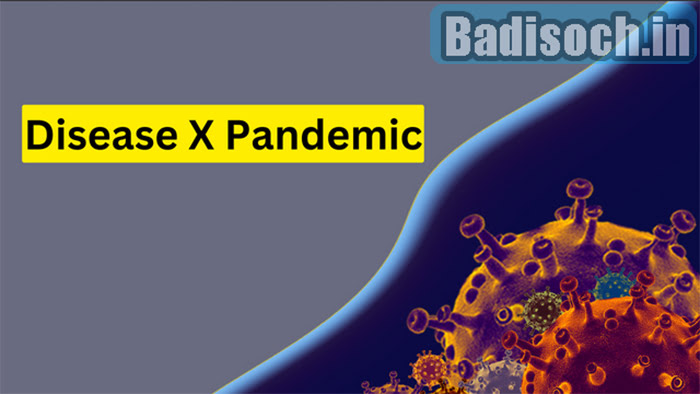Disease X Pandemic : As per a report from the Daily Mail, global health experts have warned that COVID-19 could be a precursor to an even more catastrophic pandemic called Disease X. Dame Kate Bingham, who leads the UK’s Vaccine Taskforce, stated that COVID-19 wasn’t as lethal as initially anticipated but issue an alarming caution that the next pandemic could result in at least 50 million fatalities.
The ongoing coronavirus outbreak has emphasized the importance of greater preparedness and investment in global health security measures to avoid or mitigate future pandemics. These precautionary steps include investing in research and development of vaccines, strengthening healthcare systems, spreading awareness about hygiene and sanitation practices, and enhancing international cooperation.
Disease X Pandemic
With COVID-19 becoming increasingly prevalent and recurring, medical specialists in the UK are now anticipating a potential outbreak of a new pandemic known as “Disease X.” They caution that the devastating Spanish Flu of 1918-1920 may bear similarities to the impact of this novel virus. The World Health Organization has designated this outbreak as the “Disease X Pandemic,” requiring the timely development and distribution of vaccinations to combat it. Nevertheless, there is currently no guarantee that this will happen.
Medical professionals have express concerns about the term “Disease X Pandemic,” which was coined by the World Health Organization. They warn us about the potential of this upcoming pandemic to cause 20 times more fatalities than COVID-19, which has already claimed over 2.5 million lives worldwide since its outbreak in 2020. It is essential to understand the ten key points regarding Disease X, such as its transmission mode, symptoms, treatment options, and prevention measures. Additionally, it is crucial to remain vigilant and prepare for any potential outbreaks of new diseases that may arise in the future. By learning from past experiences and taking proactive measures, we can reduce the impact of future pandemics on human health and wellbeing.
Disease X Pandemic Details
| Article Name | Disease X Pandemic |
| Category | News |
 |
|
| Telegram | |
| Official Website | Click Here |
Also Check: Kedarnath Opening Date 2023
The Looming Danger Of Disease X
The warning from scientists about the potential for a future pandemic echoes the World Health Organization’s (WHO) prediction of an “inevitable” outbreak of “Disease X.” The WHO had coined this term in 2018, prior to the COVID-19 pandemic. Within the organization’s list of priority diseases for the next potential pandemic are Ebola, SARS, and Zika. It is critical that we continue to invest in research and preparedness efforts to mitigate the impact of such outbreaks and reduce their toll on human lives.
The declaration made by the WHO states that “Disease X signifies the understanding that a severe global epidemic could arise from a pathogen that is presently not known to cause illnesses in humans.” The Blueprint list encompasses infectious conditions for which there are no available treatments. There is concern among certain public health experts that the next Disease X may be zoonotic, similar to Ebola, HIV/AIDS, and Covid-19.
Check Here: Tax Audit Due Date for AY 2023
The Need For Pandemic Preparedness
According to the authors, Covid-19, which claimed the lives of 20 million individuals globally, was not the most severe scenario. They point out that the virus resulted in fewer fatalities compared to Ebola, avian flu, and MERS. The authors posit that luck alone cannot avert a future pandemic that could potentially be more deadly and contagious. While the majority of virus patients successfully recovered, Ebola had a fatality rate of 67%, followed closely by bird flu at 60%. MERS also had a fatality rate of 34%.
The author of the article warns that the next outbreak cannot be controlled, and therefore proposes several measures to prepare for pandemics. Investing in vaccine research and development is essential to tackle any future outbreaks. Strengthening health systems and surveillance can help to detect and respond quickly to any potential threats. Improving global collaboration and coordination is crucial as pandemics do not respect borders. The author emphasizes that we must take action now because the next epidemic is inevitable, and the world needs to be ready. By taking these steps, we can minimize the impact of future pandemics and prevent them from becoming as widespread as COVID-19.
What Is Most Likely To Cause The Next Disease X Pandemic Threat?
Although we cannot be certain, it is highly probable that the next pandemic will arise from one of the six virus families: Adenoviridae, Coronaviridae, Orthomyxoviridae, Paramyxoviridae, Picornaviridae, and Poxviridae. These families, among approximately two dozen others that have the ability to infect humans, exhibit these characteristics and are therefore the most likely candidates for being the origin of the next global outbreak.
- No immunity – The global population does not possess inherent immunity.
- Airborne – Transmitted through respiration
- Silent – Can be transmitted by individuals who are sick but show no symptoms.
- Harmful – At present, there are no medications or vaccinations that are both effective and efficient.
Look Here: ISRO Chandrayaan 3 News & Updates Today 23
How can we make Medical Countermeasures Without Knowing Which Disease (“DISEASE X”) Will Strike Next?
- Instead of focusing on a specific virus that may or may not be a future threat, the emphasis is place on developing medicinal countermeasures for viral families that are more likely to cause pandemics.
- It is essential for the United States to allocate funds towards a cutting-edge Disease X Medical Countermeasure Program, specifically designed to utilize vaccination platforms and technology that are best suited for the virus families with the highest potential to cause severe disease outbreaks in the future.
- With the development of the next member of the viral family, it is possible to easily modify medical countermeasures that were initially designe for one member to target another.
- By employing this flexible approach, private-public partnerships can potentially develop vaccines, antiviral drugs, and diagnostics for various unknown potential pandemic viruses in a matter of months, rather than years.
Read More: Who Is Seema Haider | Seema Haider News
How To Stop the Next Pandemic Before It Starts?
The recent COVID-19 pandemic has shown us just how devastating a global health crisis can be. But what if there was a way to prevent the next pandemic before it even starts? In this blog post, we will explore the strategies and measures that can be taken to identify and mitigate potential pandemics before they become widespread. From early detection systems to improve surveillance and response capabilities, there are steps that can be taken to minimize the impact of future outbreaks. Join us as we delve into the world of pandemic prevention and learn how we can protect ourselves and our communities from future health crises.
In order to avoid the occurrence of the next pandemic, it is necessary for us to:
- Make an Investment in Surveillance: Establish strong global surveillance systems to promptly identify emerging threats.
- Encourage the concept of One Health by acknowledging the interconnectedness of human, animal, and environmental health in order to identify and address risks.
- Promote the responsible use of antibiotics by implementing antimicrobial stewardship strategies to combat the emergence of drug-resistant pathogens.
- Enhancing Healthcare Systems: Develop the capabilities of healthcare systems to effectively address both pandemic situations and regular healthcare requirements.
- Promote worldwide collaboration in the exchange of information, allocation of resources, and research endeavors.
- Preparedness Plans: Create thorough plans for dealing with pandemics, which should include storing necessary supplies and establishing teams that can respond quickly.
Conclusion
Disease X is a term used to describe an unknown or newly emerging infectious disease that has the potential to cause a pandemic. While it may sound like something out of a science fiction movie, the reality is that the threat of Disease X is very real. With our increasingly interconnected world, where people and goods are constantly traveling across borders, the risk of a global pandemic is higher than ever before. This is why it is crucial for governments, organizations, and individuals to be prepared and proactive in their response to potential outbreaks. From early detection and surveillance systems to robust healthcare infrastructure and international cooperation, there are many steps that can be taken to mitigate the impact of Disease X and protect global public health.
Disease X Pandemic FAQ’S
When this is called pandemic?
A pandemic refers to the global transmission of a novel disease. The most probable candidates for such outbreaks are viral respiratory illnesses, like those caused by a newly identified influenza virus or the coronavirus COVID-19. It is important to note that a pandemic and an epidemic should not be confused as they have different meanings.
What was the first ever pandemic?
The earliest recorded pandemic was the Plague of Athens, which spread throughout the Mediterranean between 430 and 426 BCE. In total somewhere between 75,000 and 100,000 people died, with the worst affected areas being in what is now Libya, Egypt and Greece. In Athens, 25% of the population died.
What are the diseases of Coronaviridae?
Coronaviruses, which include COVID-19, Middle East Respiratory Syndrome (MERS), and Severe Acute Respiratory Syndrome (SARS), are a diverse group of respiratory viruses. These viruses can cause illnesses in both animals and humans.
Is COVID the first pandemic?
The novel human coronavirus disease COVID-19 has become the fifth documented pandemic since the 1918 flu pandemic.
Related Post:
